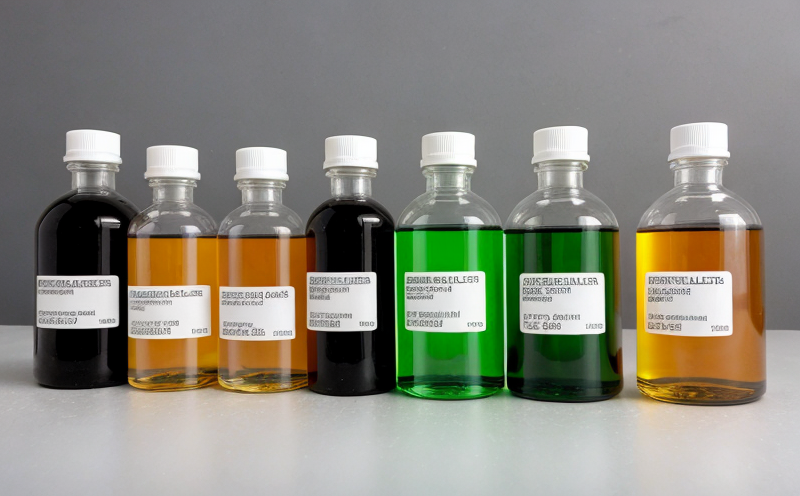ISO 10993-18 Volatile Organic Compounds VOC Analysis by GC-MS
The ISO 10993 standard is a cornerstone in medical device testing, ensuring that devices are safe for use. The ISO 10993-18 specifies requirements for the identification and quantification of volatile organic compounds (VOCs) leached from medical devices during storage or use. This service focuses on the analysis of VOCs using gas chromatography-mass spectrometry (GC-MS), which is essential for ensuring that a device does not release harmful chemicals into the body.
The process begins with sample preparation, where the device or its components are subjected to simulated use conditions or storage environments. This step ensures that the leachable and extractable compounds are accurately represented in the analysis. The extracted compounds are then separated by GC-MS, which provides precise identification and quantification of VOCs.
The significance of this test lies in the potential health risks posed by certain VOCs. For instance, some VOCs like benzene or toluene can have adverse effects on human health if they accumulate in bodily tissues. By conducting this analysis, we ensure that medical devices meet stringent safety standards and do not introduce harmful substances into the patient.
The acceptance criteria for this test are based on international standards such as ISO 10993-18. The results must demonstrate compliance with these guidelines to ensure the safety of patients who use the device. Our laboratory adheres strictly to these standards, ensuring accurate and reliable analysis. This service is particularly important in the medical device sector where patient safety is paramount.
Our team of experts uses state-of-the-art GC-MS equipment to perform this analysis. The instrument's precision allows for the detection of even trace amounts of VOCs, which is critical given the potential risks associated with these compounds. By leveraging advanced technology and rigorous testing protocols, we provide clients with confidence in the safety and reliability of their medical devices.
In addition to the technical aspects, this service also contributes to environmental sustainability by reducing unnecessary waste and ensuring that only safe materials are used in device manufacturing. This aligns with broader industry goals towards more sustainable practices.
Why It Matters
The safety of medical devices is critical not just for the manufacturers but also for healthcare providers and most importantly, patients. By adhering to international standards like ISO 10993-18, we ensure that every device tested meets stringent requirements regarding VOCs. This service plays a crucial role in minimizing risks associated with potential harmful emissions from medical devices.
The significance of this test cannot be overstated. It helps identify and quantify VOCs that may leach out during the use or storage of medical devices. These compounds, if present in unsafe levels, could pose significant health hazards to patients, especially those who are more vulnerable due to their condition or the nature of the device.
The results from this analysis serve as a key factor in determining whether a device is safe for clinical use. Regulatory bodies often require such testing to ensure compliance with safety regulations. By providing accurate and reliable data through ISO 10993-18 compliant analysis, we contribute significantly to maintaining high standards of patient care.
Moreover, this service supports the continuous improvement cycle in medical device manufacturing. It allows manufacturers to identify potential issues early on, thereby preventing costly recalls later in the product lifecycle. Early detection also helps streamline regulatory approval processes, speeding up time-to-market for new devices.
Quality and Reliability Assurance
- Precision: Our GC-MS equipment provides high precision in detecting even trace amounts of VOCs. This ensures accurate quantification which is crucial for compliance with ISO 10993-18.
- Reproducibility: The methods used are reproducible, allowing consistent results across multiple samples and testing sessions.
- Data Integrity: All data generated during the analysis process is securely stored and easily accessible for review and verification purposes.
- Traceability: Every test run can be traced back to specific conditions and parameters ensuring accountability and reliability.
The combination of these factors ensures that our clients receive reliable, high-quality results which are essential for making informed decisions regarding device safety and efficacy.
Environmental and Sustainability Contributions
Incorporating ISO 10993-18 compliant VOC analysis into the medical device development process helps reduce environmental impact by ensuring that only safe materials are used in manufacturing. This aligns with broader industry goals towards more sustainable practices.
The use of advanced analytical techniques like GC-MS not only ensures compliance but also contributes positively to environmental sustainability through reduced waste and optimized resource utilization. By identifying potential hazards early, this service helps prevent the release of harmful compounds into the environment during device disposal or end-of-life processing.
Furthermore, by supporting continuous improvement in medical device design and manufacturing processes, we contribute to long-term reductions in material usage and energy consumption associated with production activities.





